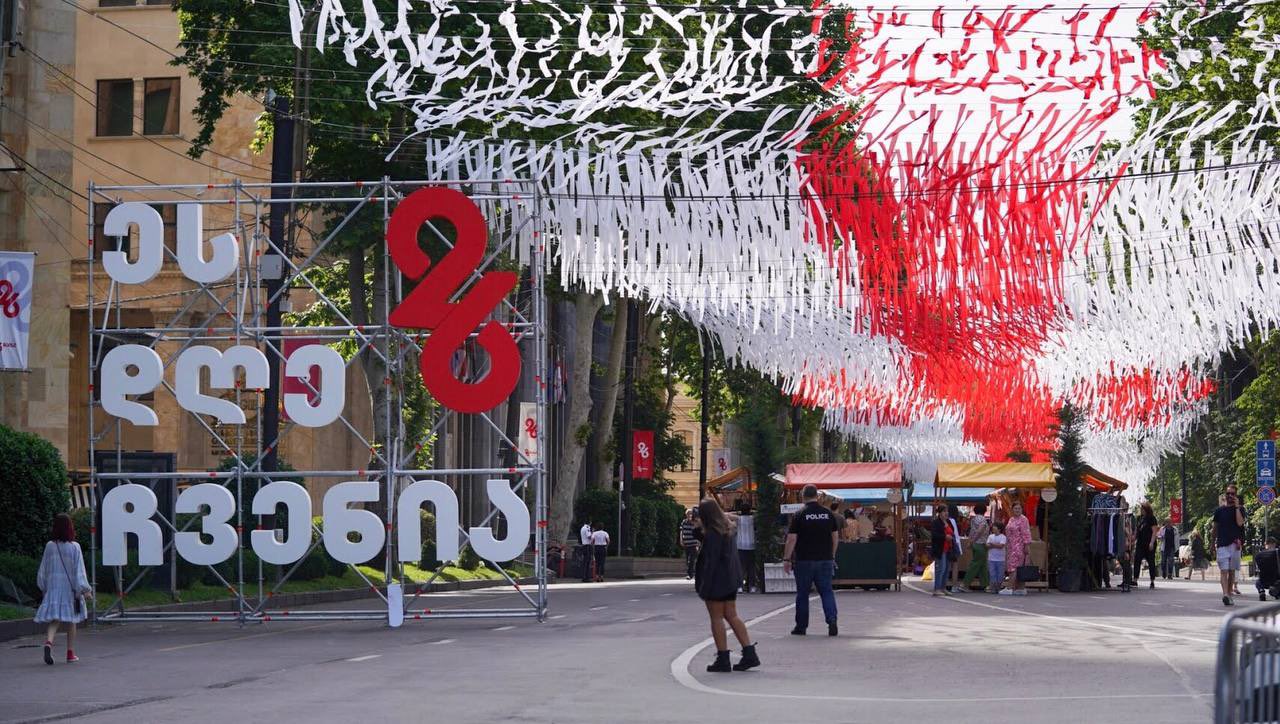Greetings and controversy for the Independence Day in Tbilisi
This year only Georgian colours were seen on the streets, and not EU flags as last year. The president of the republic, Salome Zurabišvili, did not miss the opportunity to stir up tensions, accusing the Georgian Dream government of pro-Russian sympathies. Messages from Armenian Prime Minister Pašinyan and Ukrainian President Zelenskyj.
Tbilisi (AsiaNews) - Georgia celebrated Independence Day all weekend, in memory of 26 May 1918, 105 years ago, when the democratic government led by Noe Žordanija proclaimed Georgia's independence from the Russian Empire.
The official slogan displayed throughout the country, next to flags in the red and white national colours, was 'With Love for Freedom!'. Public demonstrations were held all over the country, especially in the capital Tbilisi.
The first Georgian democratic republic lasted only two years, and was incorporated into the Soviet Union after the end of the civil war between the Whites and Reds in 1920. With the dissolution of the USSR, Georgia proclaimed its independence again in 1991, celebrating on the same day and with the same solemn Declaration of 1918, thus adding another 32 years to the 2 years at the beginning of the 20th century.
This year only Georgian colours were seen on the streets, and not EU flags as last year, when Georgia was waiting for EU candidate status. The whole year passed amidst the pendulum of controversy between Europe and Russia, and the president of the republic, Salome Zurabišvili, did not miss an opportunity to stir it up, accusing the government of pro-Russian sympathies. However, the opposition waved European flags along Rustaveli prospekt, the central street of Tbilisi closed to traffic for the celebrations.
Zurabišvili said that 'it is not understandable, and offensive to our people, when the government does not think about the honour and dignity of its citizens'. In his opinion, the Georgian Dream government should do much more to 'work out a reasonable policy together with international partners, and use the historical moment to bring Georgia into the European family'. His speech was interrupted several times by grumbling from the authorities' gallery itself, even before the crowd.
Despite the controversy, the Rustaveli prospekt was transformed as usual into a scene of folk dancing and singing, with exhibitions and concerts brightening up the 'popular promenade' that makes Tbilisi so similar to the southern European cities of Italy, Spain or Greece. Acrobatic planes whizzed over the city centre, their smoky trails also forming the colours of the Georgian flag. The festivities ended with a big concert on Republic Square, and a fireworks display.
The celebration spread throughout the country, and from Tbilisi itself, theatre collectives and music groups spread out to make everyone feel like one big family. Even Armenia's cousins, with whom there has always been an intense love-hate relationship, congratulated the Georgians: this was done by the premier of Yerevan, Nikol Pašinyan, in a message stating that 'the deepening of good relations and mutual support with Georgia is one of the priorities of the Armenian government's foreign policy'.
In turn, the President of Ukraine, Volodymyr Zelenskyj, wished his Georgian neighbours well, with a message to President Zurabišvili reminding them that 'relations between our peoples are based on mutual respect and support, which is particularly important under the conditions of Russia's devastating armed aggression against Ukraine... we will always support Georgia's sovereignty and territorial integrity, within internationally recognised borders'. Zelenskyj is convinced that 'our peoples will be able to de-occupy their territories, restoring both Georgia and Ukraine a just peace, and the entire Black Sea region a solid security'.
11/08/2017 20:05







.png)










